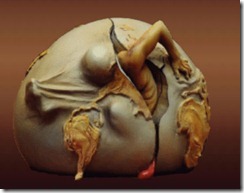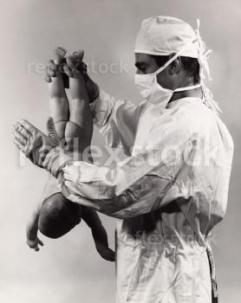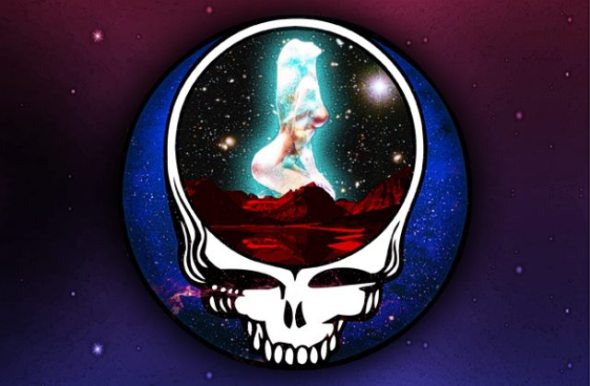Biologically Constituted Realities, Part Three: Going Beyond Jung … Our Prenatal and Perinatal Experiences Predispose the Nature of Our Mind
You cannot convince a fish it lives in water. You can only give the fish the experience of being in air; then it will understand.
“Our conception, gestation, and birth can be seen to form our underlying myths . . . but much more than that as well; they also create the very foundational templates upon which we build our view of reality—physical, social, emotional, spiritual, and philosophical.”
Our Perinatal Paradigm
Carl Jung is one man in particular who decades ago, in many thoroughly encompassing works, expressed similar concepts regarding biocultural patterns as being species-specific for humans—the hereditary remnants of what are called instinct in animals, as he put it.
Beyond Jung

 Without diminishing the historical importance of his contributions, I need to stress that what I am asserting goes much further than Jung’s contentions. For I believe we biologically determine our view of reality, as a species, (1) in the biological structures that comprise us and orient us in a world of space; (2) in the biochemical processes that constitute our changingness and situate us in a world of time; (3) and, most saliently, in the individual biological history that is universal for us and unique to us as a species.
Without diminishing the historical importance of his contributions, I need to stress that what I am asserting goes much further than Jung’s contentions. For I believe we biologically determine our view of reality, as a species, (1) in the biological structures that comprise us and orient us in a world of space; (2) in the biochemical processes that constitute our changingness and situate us in a world of time; (3) and, most saliently, in the individual biological history that is universal for us and unique to us as a species.
By this last I mean that our conception, gestation, and birth can be seen to form our underlying myths . . . but much more than that as well; they also create the very foundational templates upon which we build our view of reality—physical, social, emotional, spiritual, and philosophical.
Our Biohistorical Experiences Determine Our World
Our Early Events Predispose the Nature of Our Mind
Elsewhere I have detailed how our universal but species-specific patterns of biological experience at conception, and throughout gestation, and at birth (and continuing from there but with immensely reduced or nonexistent universality) conditions and shapes all later experience (Adzema, 1981, 1984, 1985). [Footnote 1]
Those early, universal events predispose the very nature of our mind; both in determining the kinds of thoughts and images we will have as well as in modeling their patterns and the connections, associations, and networks among them.
Our Early Events Shape Our Social, Cultural, and Physical Worlds, Which We Create With Our Minds

 Those biohistorical events consequently end up configuring our sociocultural structures, which we conceive and modify with less deeply-rooted thoughts and images emanating from idiosyncratic later events. Likewise, these foundational events shape and inform the myths by which we live, the motives that
Those biohistorical events consequently end up configuring our sociocultural structures, which we conceive and modify with less deeply-rooted thoughts and images emanating from idiosyncratic later events. Likewise, these foundational events shape and inform the myths by which we live, the motives that 
 inspire us, the feelings and emotions that move us, and the attitudes that are our thickly matted screens across our windows to the world, and much else. Indeed, in my conceptualization, these biohistorical
inspire us, the feelings and emotions that move us, and the attitudes that are our thickly matted screens across our windows to the world, and much else. Indeed, in my conceptualization, these biohistorical 
 experiences delineate the very paradigms within which we live; therefore, there is very little of experiential reality that is not in some way linked, modeled, or bounded by the effects of these events. [Footnote 2]
experiences delineate the very paradigms within which we live; therefore, there is very little of experiential reality that is not in some way linked, modeled, or bounded by the effects of these events. [Footnote 2]
It follows that within our societies and “cultures,” themselves modeled inside these parametric, experientially based outlines, we are also influenced concerning the very things we write about, investigate, study, and then discuss . . . and the manner in which we do so.
Continue with The Doors of Perception: Each of Us Is Potentially Mind At Large… When Perception Is Cleansed, All Kinds of Nonordinary Things Happen
Return to We Can’t Know What We Can’t Know but We Cannot Unknow What We Are: Our Reality Is Species Determined and the Relativity of Science
Footnotes
1. ![]() My contentions (Adzema, 1981, 1984) are that these particular (i.e., these early, these pre- and perinatal) experience/memory templates are especially related to the following:
My contentions (Adzema, 1981, 1984) are that these particular (i.e., these early, these pre- and perinatal) experience/memory templates are especially related to the following:
(1) fundamental constructions in our worldview
—e.g., sperm/egg leading to perception of duality in the universe
(2) attitudes towards life
![]() —e.g., struggle of sperm alternating with “slothful” egg being the basis of the universally proclaimed alternating or cyclic character of personal or spiritual growth; also the predominating work/play dichotomy
—e.g., struggle of sperm alternating with “slothful” egg being the basis of the universally proclaimed alternating or cyclic character of personal or spiritual growth; also the predominating work/play dichotomy
![]() —also, the fertilized egg experience: survival/achievement bought at cost of hundreds of millions of others dead leading to primordial guilt as well as prevalent attitude that accomplishment never brings expected rewards; disillusionment
—also, the fertilized egg experience: survival/achievement bought at cost of hundreds of millions of others dead leading to primordial guilt as well as prevalent attitude that accomplishment never brings expected rewards; disillusionment
also, zygote must continue working, must reproduce itself, must move and implant itself . . . each time or die, leading to attitude that there is no end to struggle, growth, achievement; nonsatisfaction (Buddhist dukkha) felt as a fundamental fact of physical existence.
(3) our concepts-feelings about the transpersonal—i.e., the religious or spiritual
—e.g., embryo and fetus grow at an incredible pace with enormous number of biological systems perfectly synchronized leading to feelings that there is meaning in all one’s actions—if in tune with the divine; also, perfect synchronicity of external and internal events in one’s world if so attuned
—also, fetus nurtured, protected, all needs met—especially through umbilical cord at navel—leading to the feeling that (1) spiritual state is one of perfect harmony, being protected, and the divine providing for all one’s needs; (2) ideas of navel as being “source” of spiritual energy or the place of connection of soul to body; (3) and, finally, leading to the
flow-in <——> flow-out feelings of proper relationship of person to society, the divine, nature, and experience.
2. There are other things, however, that are crucial in the creation of our biological worldview. These include, of course, anatomical, biochemical, and other biological shapers and formers of our reality as we generally perceive it as a species, which have to be seen as even more fundamental—representing more pervasive yet subtler determiners and modelers of all above them. Then there are the other universal determiners and/or directors of experience that fall under the rubric of transpersonal . But there is a completely different “board” for that “game” than the one on which we are working. Specifically, it amounts to “bumping” the Newtonian-Cartesian paradigm that I am working off of in making this argument about biologically constituted realities and adopting instead the holonomic perspective that I discuss further on.
Continue withThe Doors of Perception: Each of Us Is Potentially Mind At Large… When Perception Is Cleansed, All Kinds of Nonordinary Things Happen
Return to We Can’t Know What We Can’t Know but We Cannot Unknow What We Are: Our Reality Is Species Determined and the Relativity of Science
Invite you to join me on Twitter:
http://twitter.com/sillymickelfriend me on Facebook: https://www.facebook.com/sillymickel









